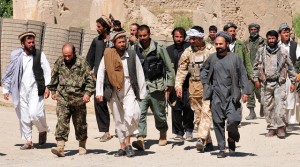
Taliban insurgents turn themselves in to Afghan National Security Forces. Photo by AslanMedia via Flickr.
While campaigning for the Pakistani elections in October 2007, Benazir Bhutto had invited Christina Lamb, Foreign Correspondent for the Sunday Times, to travel with her on an election bus en route to a rally in Karachi. The mood was joyful, as the public waved Pakistani flags and children cheered for Bhutto.
Then, just before midnight, bombers struck. The first blast was minor; the second was devastating.
“You could hear sirens and screaming, and everything around [the bus] seemed to be on fire”, said Lamb, describing her experience to the Oxford International Relations Society (IR Soc) on February 13. “As we ran through the streets, everywhere there were just severed limbs, blood, and lots of plastic sandals.”
As Bhutto and Lamb watched the BBC coverage of the blasts later that night, they learned that around 150 people had been killed. Before leaving for her room, Lamb said, Bhutto had touched photos of her children, wondering if she would ever see them again. Ten weeks later, she was assassinated at a political rally in Rawalpindi.
As a four-time winner of the Foreign Correspondent of the Year Award, Lamb has long been acquainted with danger. She embedded with young mullahs in Afghanistan as they fought the Soviets, and years later covered the war in Iraq. She amused the audience at IR Soc with stories of how her son’s first present was from Augusto Pinochet, who she interviewed right after giving birth, and how she uses football to break the ice with the Arsenal-supporting rebels in Mali.
The talk became more serious, however, as Lamb touched on foreign policy, particularly the American drone strike campaign. Since 2004 the United States has launched hundreds of drone attacks to defeat Taliban and al-Qaeda militants in Pakistan. Although the US Department of State has justified the campaign based on the right to self-defence, others have argued that it is a violation of Pakistan’s sovereignty. There has also been controversy over the targets of the strikes, for organisations like the Brookings Institute and the Bureau for Investigative Journalism claim that many, if not most, of those killed have been civilians. Lamb does not believe that the strikes are a long-term solution, for not only have they bred greater resentment amongst Pakistani citizens, but they have also failed to stop al-Qaeda’s operations. She is particularly troubled by the lack of transparency that accompanies the attacks; the CIA refuses to disclose the intended targets or the actual casualties of a strike. “I think it’s very interesting that you have Obama, who is a Nobel Peace Prize Winner, presiding over worlds biggest secret assassination cover-up”, said Lamb. “There’s people who say [that], if Bush had been doing that, there would have been a very different reaction.”
In an interview with The Globalist, Lamb argued that investing in the educational infrastructures of countries like Afghanistan and Pakistan would be a more effective way to counter anti-Western sentiment. “The West hasn’t really done anything to help itself. I think people should have been investing long ago in education, and not allowing the madrassahs to become the main form of education for many people”, she said. Lamb also believes that Western governments should support free and fair media coverage in places like Pakistan, where journalists are often killed for their reporting. She supports the Institute for War and Peace Reporting, which trains local journalists in areas of conflict.
Lamb concluded her talk by discussing the necessity of women reporters in war coverage. For one, in more conservative countries, women journalists, unlike their male counterparts, are able to interview both men and women. Furthermore, because most British news editors and war journalists are male, the focus of most reports tends to be on fighting and male soldiers, paying little attention to women.
“Women are basically supposed to be victims or wives of soldiers. People seem to forget that there are actually women on the front line, trying to feed their children and educate them and they’re as much of the story – they might even be more of the story than the actual fighters. So I think it’s very important that women cover wars, because I know, after 25 years, we [women] do it quite differently”, she said.



